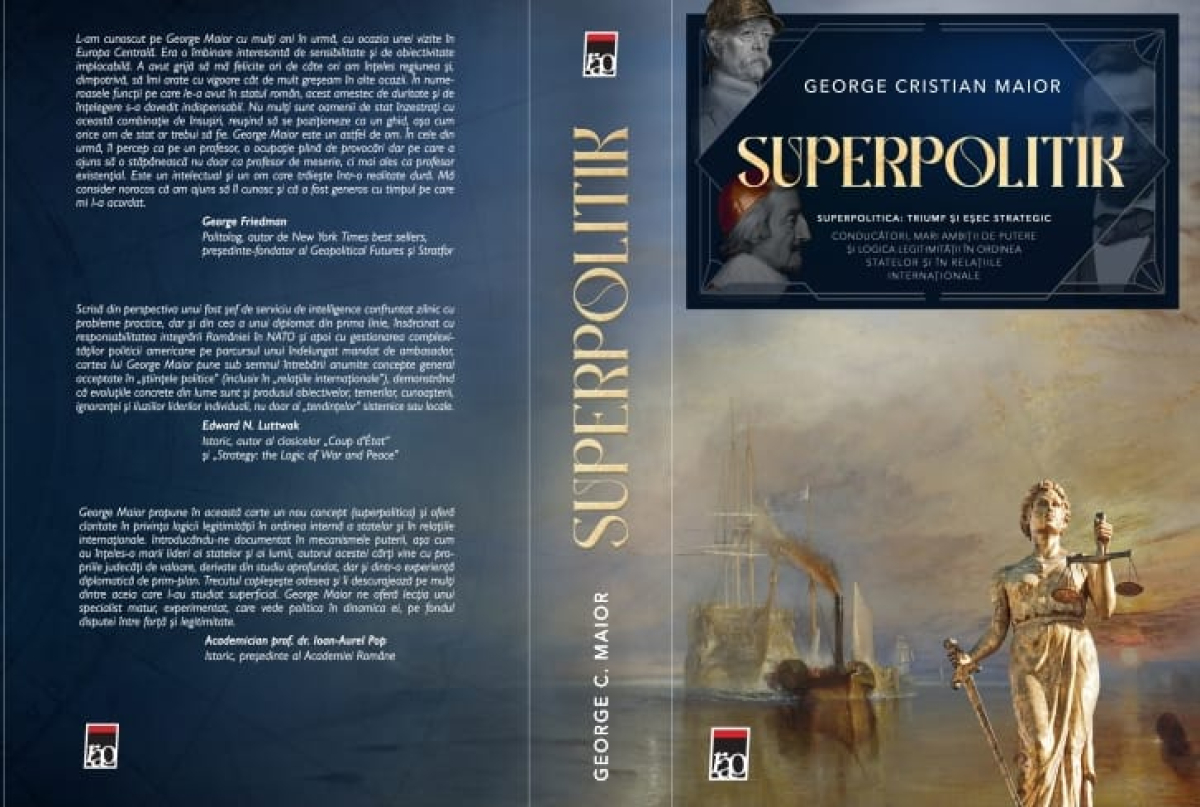George Maior releases the book „Superpolitica”. The diplomat is described by George Friedman as „an existential teacher!”. „I consider myself lucky to have met him”
:format(webp):quality(80)/https://romaniatv.net/wp-content/uploads/2024/06/George-Maior.jpg)
:format(webp):quality(80)/https://romaniatv.net/wp-content/uploads/2024/06/George-Maior.jpg)
George Maior’s book, „Superpolitica”, will be released in July at the RAO publishing house. Having a diplomatic experience of over 30 years, George Maior talks in his book about the decisions of leaders in history, power ambitions, strategic mistakes made over time. Moreover, George Maior focused on the history of the Arab world and how it relates to the geopolitical situation generated by the war in Ukraine.
„It is a book I’ve been working on for many years, it is called Superpolitica, with a subtitle: Leaders, great power ambitions and the logic of legitimacy in the order of states and in international relations. The book aims to capture this relationship in a historical and comparative perspective , always sensitive, between strategy and an element of legitimacy and justice that exists in international relations. It is a very difficult, interesting subject. I try to focus on many personalities from history and show the public what a strategic mistake means, what negligence means from the point of view of approaching justice in the state, what it means, after all, „win” for a state, in terms of national interest, or „loss” if the decisions were wrong. I don’t want to comment more, I hope it will be published this fall. When I was talking about a comparative study, I also approached the history of the Arab world in relation to Islam, which had its own dynamics, its own strategic thinking and culture, which had moments of glory and moments of decline, important in history and to try to I also analyze in a contemporary context” said George Maior, for DCNews.

In the book, the political scientist George Friedman describes George Maior as „an interesting combination of sensitivity and implacable objectivity.”
„I met Maior many years ago, during a visit to Central Europe. It was an interesting blend of sensitivity and relentless objectivity. He congratulated me whenever I understood the region and, on the contrary, showed me with vigor where I was wrong. In the many positions he held in the Romanian state, this mixture of toughness and understanding proved indispensable. Not many statesmen are endowed with this combination of attributes, managing to position themselves as a guide, as any statesman should be. George Maior is such a man. Finally, I perceive him as a teacher, an occupation full of challenges, but which he has come to master not only as a professional teacher, but especially as an existential teacher. He is an intellectual and a man who lives in a harsh reality. I consider myself lucky that I got to know him and that he was generous with his time.” writes George Friedman.
Edward N. Luttwak, historian, author of the classics „Coup d’Etat” and „Strategy: the Logic of War and Peace”, describes the themes addressed in Maior’s work.
„Written from the perspective of a former head of the intelligence service faced daily with practical problems, but also from that of a front-line diplomat, charged with the responsibility of Romania’s integration into NATO and then with managing the complexities of American policy during a long term as ambassador, George Maior’s book calls into question certain generally accepted concepts in „political science” (including international relations), demonstrating that concrete developments in the world are also the product of the goals, fears, knowledge, ignorance and illusions of individual leaders, not only of „tendencies „systemic or local”.
Ioan Aurel Pop, president of the Romanian Academy, points out that the title of the book derives from a concept invented by George Maior, „superpolitics”.
„Author and editor of substantial and political works, diplomacy, military theory, strategy and secret services, George Cristian Maior is an unshakable creator through the solidity and soundness of his arguments. His books, editions and studies have a fundamental characteristic, they put the memory in the foreground collective, meaning history. The fact is also visible in this new work of a new concept: „Superpolitics”. It provides clarity regarding the logic of the internal order of states and international relations. George Cristian Maior knows that the present is too short a dimension to be relevant in itself, that the future is always uncertain, for which he inevitably appeals to the past, that is, to the certainty of the life that was. He knows that the past is life and that from this life comes the essence of experience, from there they can reach us certain saving suggestions because time is unique in its flow and because its division into past, present, future is only a human convention”, said the academician Ionel Aurel Pop who wrote the foreword of the book”.